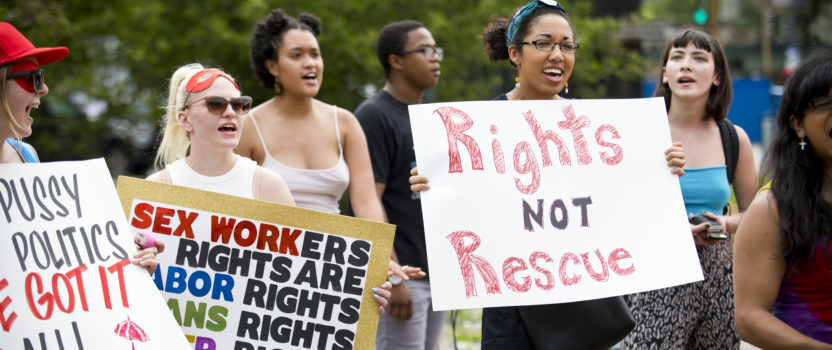Sex Workers Rise Up for Safety
Today, sex workers in DC — and around the world — rose up to reclaim safety for everyone with International Whores Day. Sex workers and allies with Collective Action for Safe Spaces (CASS), HIPS, BYP100, No Justice No Pride, Trans United Fund, and Metro DSA convened at Eastern Market Metro at 2pm to resist legislation that hurts sex workers and promote legislation to to decriminalize sex work in DC.
In late March, the Senate passed two pieces of legislation — the Stop Enabling Sex Traffickers Act (SESTA) and the Allow States and Victims to Fight Online Sex Trafficking Act (FOSTA) — under the pretense of protecting sex trafficking victims. While SESTA and FOSTA may derive from good intentions, they miss one crucial point: while sex trafficking is coerced, sex work is consensual, and shutting down safe spaces for sex workers will not cure sex trafficking.
The legislation has already had a dire impact on sex workers in DC. For adults working in the sex trade, shutting down websites like Craigslist personals and Backpage drives them out of the spaces keeping them safe and into street-based sex work, putting them at greater risk of violence.
This is of particular concern for transgender adults – particularly those of color – who experience high rates of unemployment and homelessness and are often left with few alternatives outside of the sex trade.
“SESTA and FOSTA pit the safety of sex trafficking victims against the safety of sex workers. Criminalizing the sex trade doesn’t make sex trafficking victims safer, and it doesn’t make them less likely to trade sex because most have few, if any, alternatives,” said Jessica Raven, executive director of Collective Action for Safe Spaces.
“If we’re all coming to this problem with the goal of keeping kids safe, then we need to pay attention to the reasons that youth are engaging in survival sex, and work to address those root causes. Otherwise, well-intentioned policies to end sex trafficking may do more harm than good. Today, we’re speaking out and educating our community about these misconceptions in the legislation.”
During the rally, activists passed out flyers debunking myths about sex work and sex trafficking.

